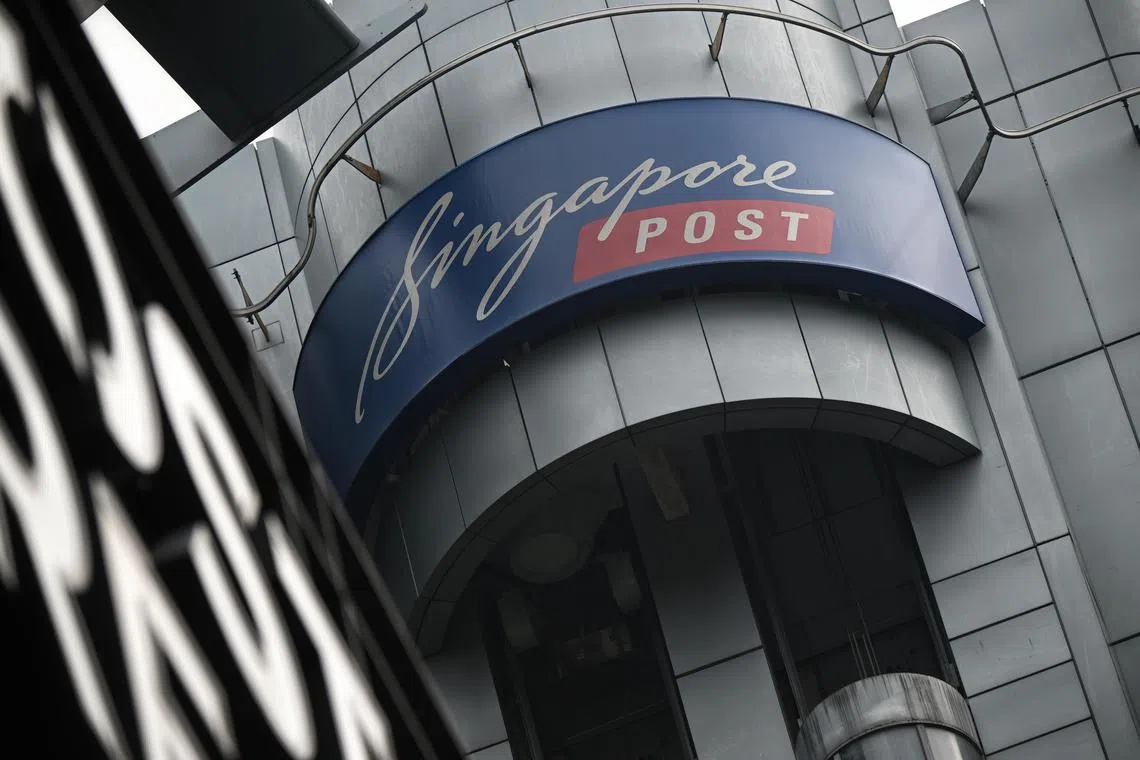SingPost reviewing ‘commercial sustainability’ of domestic postal business, which sees first annual loss
Sign up now: Get ST's newsletters delivered to your inbox

For the full year ended March 31, SingPost recorded a 70.3 per cent fall in net profit to $24.7 million, from $83.1 million a year ago.
ST PHOTO: KUA CHEE SIONG
Follow topic:
SINGAPORE – Mail deliveries could be under threat amid a wide-ranging review by Singapore Post that will put the loss-making division under the microscope.
The review comes as the post and parcel unit reported its first-ever annual loss, an outcome that is expected to continue given the decline in consumers using mail services.
SingPost group chief executive Vincent Phang told a results briefing on Thursday that the review had only just begun, and he could not predict how long it would take.
He added that the domestic postal business had been in relentless decline for some time, with profitability dropping year by year until it fell into the red for the first time in the past financial year that ended on March 31.
A spike in e-commerce volumes during the Covid-19 pandemic had helped mask the poor performance of the segment, but as economies reopened, revenues have returned to normal levels, making it difficult to compensate for the decline in the postal letter mail business.
However, the good news for shareholders is that domestic business is now being overtaken by SingPost’s Australian and international divisions, which have grown to account for 86 per cent of the group’s overall revenue.
This shift in the revenue mix has prompted SingPost management to re-evaluate all its business segments to see if they still fit into the group’s goal of becoming a global logistics player, not just a Singapore postal services company.
Chief financial officer Vincent Yik told the briefing that Singapore’s post and parcel segment used to account for more than 80 per cent of operating profit as recently as five or six years ago. That mix has reversed, with the group’s international business now accounting for the lion’s share.
Mr Yik also pointed out that even if the group invested in its Singapore operations to the extent that it gained total market share, it would amount to revenue of only about $300 million to $400 million.
In contrast, the potential in Australia remains considerable, given SingPost’s barely 1 per cent share of the $100 billion logistics market Down Under.
He also noted that while Singapore accounted for about 70 per cent of the group’s fixed assets, the operations generated a rather small profit. Australia, on the other hand, accounts for the rest and makes up the majority of group earnings.
These fixed assets include infrastructure such as post offices, sorting machines, delivery vehicles and warehouses.
SingPost intends to expand with this asset-light approach in mind, using 4PL (fourth-party logistics) technology, via a proprietary platform that it owns through its Australian unit, FMH.
Essentially, the technology allows SingPost to play “matchmaker” between clients who want items delivered and other logistics players who deliver these parcels.
The system gives clients the best prices available, while delivery companies can optimise the use of their trucks.
Mr Phang said SingPost was also looking to expand into South-east Asia, which has tremendous potential.
SingPost recorded a 70.3 per cent fall in net profit to $24.7 million for the 12 months to March 31, down from $83.1 million a year earlier, due in large part to the faltering post and parcels unit.
The unit recorded a full-year loss of $15.9 million, compared with a profit of $24.9 million in 2022, due to a decline in delivery volumes, coupled with costlier labour, utilities and fuel, as well as higher conveyance expenses.
SingPost said it expects the post and parcel business to “continue to be loss-making” this financial year.
Overall revenue rose 12.4 per cent to a record $1.87 billion, due mainly to the group’s new engine of growth, Australia.
SingPost posted a 28 per cent drop in second-half earnings to $34.6 million from $48.1 million a year earlier, while revenue declined 2.2 per cent to $913.4 million.
The board has recommended a final dividend of 0.4 cents per share. Including the interim dividend of 0.18 cents per share, SingPost’s total dividend would amount to 0.58 cents per share, or about 40 per cent of its underlying profit.
SingPost shares closed unchanged at 51.5 cents on May 11.


